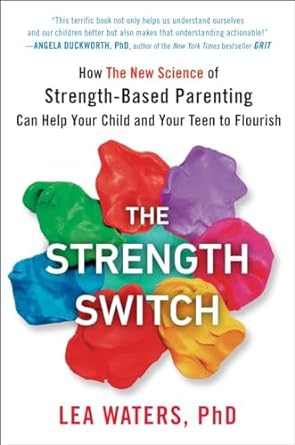Last week we covered Mary Reckmeyer’s Strengths Based Parenting: Developing Your Children’s Innate Talents, the starting point for my articles about strengths-based parenting (for Parents) and strengths-based education (for U.S. News & World Report).
Lea Waters, Ph.D., takes things a step further, teaching parents how to integrate a strengths-based approach into a more general positive parenting philosophy. “Instead of asking what’s going wrong, ask what’s going right,” she says. When it comes to disappointing behavior, say to yourself: “I wonder what underlying strength is motivating them to do that” or “What strength does my child have that could help her handle this differently?” She calls this shift in perspective “the strength switch,” and it comes from having a slightly different take than Reckmeyer.
In Waters’ book, all children have all the strengths (she identifies more than 100, pulling from Gallup’s set and several others), defined as “things we do well, often, and with energy.” While it’s important to identify, name, and foster the ones that come most easily to children, a parent’s positive framing can also influence how they view “what comes hard.” She writes of her own son, “The more I commented on his success in organizing his things, the more he understood himself to be a strong organizer, and therefore the more likely he was to remember to stow the bike.”
But she also echoes Reckmeyer in emphasizing that kids must be made to know that to have weaknesses is to be human, not flawed.
In chapters that read like TED talks, Waters goes on to discuss the nitty-gritty of how to parent from a strengths-based perspective at various stages. That includes supporting concepts such as mindfulness, growth mindset, modeling, scaffolding, emotion coaching, building self-control, effective praise, and more. The book and its website, www.strengthswitch.com, are a veritable treasure trove of positive-parenting guidance. Highly recommend.
——————————
Bonus review: Your Child’s Strengths: Discover Them, Develop Them, Use Them
For those looking for more, Jenifer Fox, M.Ed., shares strategies acquired as a strengths-based educator (e.g., “Children who are easily verbally excited need channeling, not outright extinguishing”). Your Child’s Strengths includes a workbook and suggested exercises (e.g., “Give your child a choice of three chores … make a note of what he chooses … [and] what he does with ease and what frustrates him [as he does it]”).
